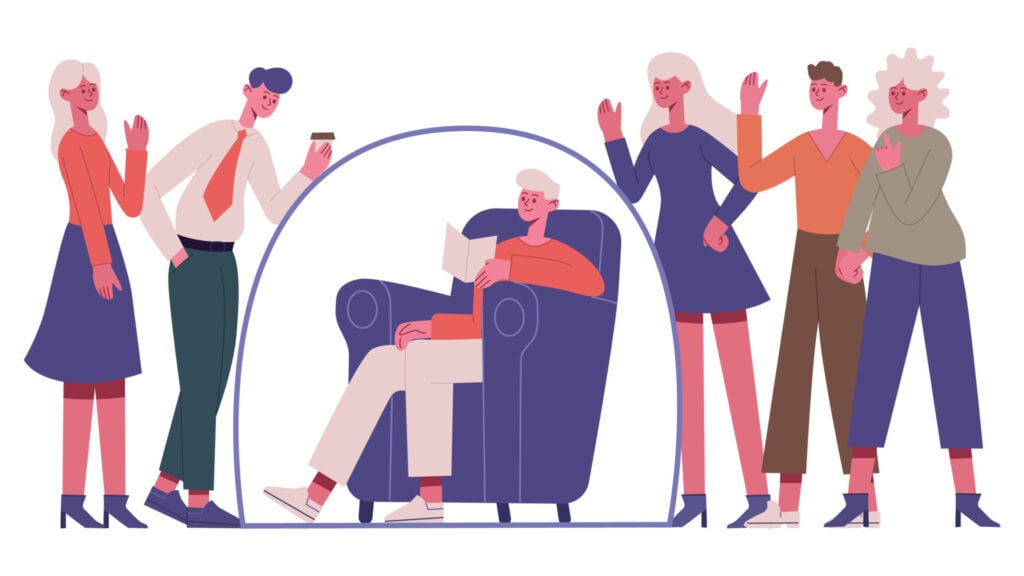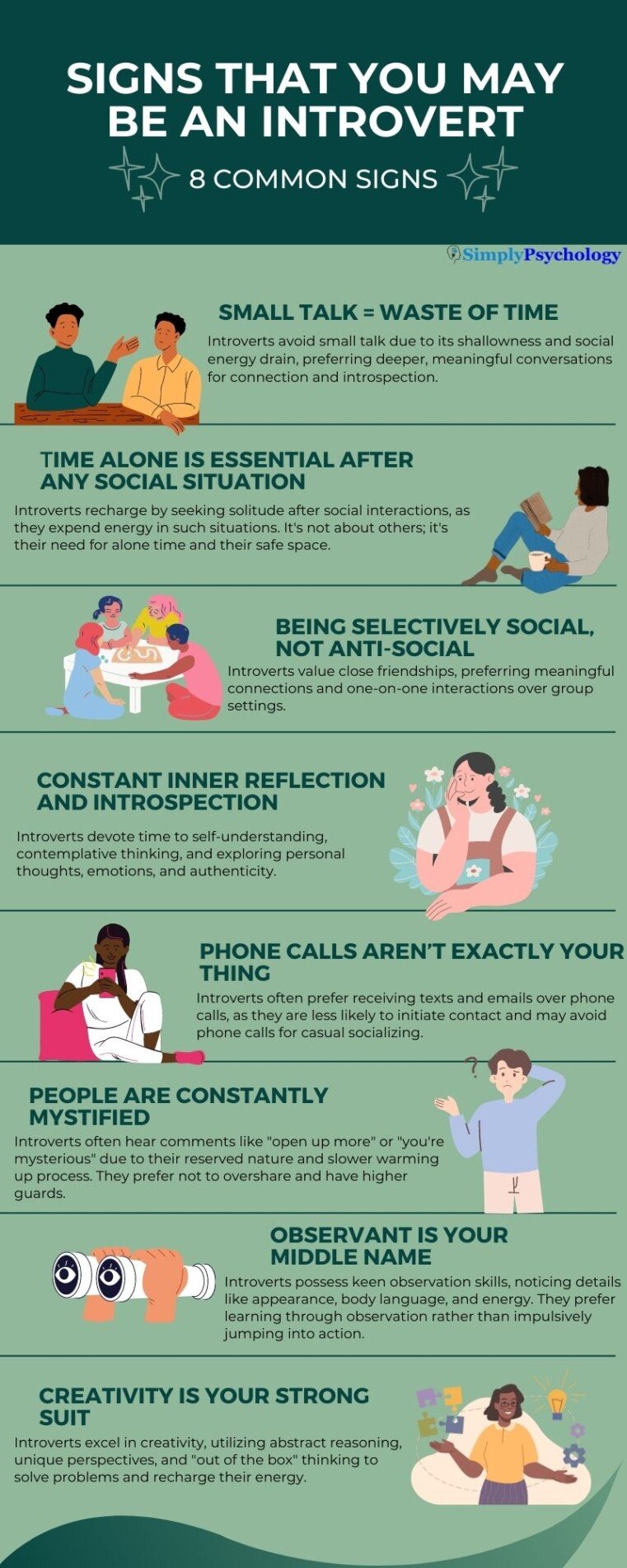Introverts tend to be quiet, reserved, and prefer solitary activities. They feel drained after social interaction and need alone time to recharge. Introverts often think before speaking, dislike small talk, and have a small group of close friends. They are internally focused and get absorbed in their own thoughts.
Key Takeaways
- The concept of introversion/extroversion was introduced in 1910 by Carl Gustav Jung, existing as part of a continuum with each personality type at separate ends of the scale.
- Introversion is a personality type characterized by traits such as reserve, passivity, thoughtfulness, and a preference to keep emotional states private.
- Introverts are most comfortable interacting in small groups and with one-on-one relationships and are energized by spending time alone.

What is An Introvert?
Introversion is a personality trait distinguished by focusing on internal feelings rather than external sources of stimulation.
It is critical to note that introversion is not the same as social anxiety or shyness – an introvert is not necessarily socially anxious or shy.
Introverts aren’t just quiet people. In fact, many introverts are not subtle at all and could even be the most outgoing person you know.
Frankly, there are still many misconceptions about an introverted personality type, even though introverts make up about twenty-five to forty percent of the population.
While it is easy to spend many hours researching the topic, many clues can help determine if you fall into the introverted group.
Introverts come in all sorts of packages. In this next section, we are going to look at the eight different signs that indicate whether you might be an introvert.
If you find yourself saying, “This is super relatable!” to most of the signs we go over, you might just have your answer.
Small Talk = Waste of Time
Introverts are incredibly skilled at active listening. As natural listeners, they process information internally, which allows them to hear, understand, and provide carefully considered insight when they give a response.
They, indeed, are not a fan of conversations that bounce back and forth too much; therefore, introverts tend to be the best people to go to if you want a good vent.
They are observers and enjoy letting people vent their feelings.
They can set aside their personal thoughts and feelings to allow someone to reflect and process on their own respectfully. They can quickly establish trust and transparency through their attentive listening, whereas extroverts tend to participate in interactive listening.
On top of this, the standard, “I watched “The Kardashians” last night, and Kim was crazy!” or “The weather is terrible today, don’t you think?” is something that doesn’t captivate introverts.
They would much rather be in the existing political climate, discussing the cosmos, or investing time in someone’s emotional matters. You also find that light chitchat can evolve into a much deeper topic when conversing with an introvert.
A simple “Have you seen the new movie “Don’t Look Up?” could progress into issues involving climate change and politics. Introverts love going in a little deeper than their extroverted counterparts.
Time Alone is Essential After Any Social Situation
Introverts tend to feel exhausted after spending some time with many people. After a day of interacting with others, whether from work or pleasure, they often need to retreat into solitude and have some well-dedicated alone time.
It has nothing to do with the surrounding people, but it is necessary to recharge – where introverts can be isolated is usually their safe place.
One of the significant characteristics of this personality type is that introverts require expending energy in social situations.
Meanwhile, their extroverted counterparts actually gain energy from such interactions.
But that doesn’t mean that all introverts avoid social events altogether. We will get into that in the next point below.
Being Selectively Social, Not Anti-Social
A widespread misconception about introverts is that they do not like people or spend time with them.
While introverts usually do not enjoy much socializing, they actually enjoy spending time around others – but introverts tend to prefer the company of close friends.
An extrovert might go to a party to meet new people and have fun. Still, instead of going to a large social circle that introverted people only know superficially, introverts tend to prefer long-lasting relationships marked by great closeness and intimacy.
Research has found that people who are classified as more introverted tend to have a smaller group of friends, while extroverts generally have a wide circle of acquaintances and friends.
Introverts typically choose their friends much more carefully, and their closest relationships tend to be profound and significant. They also prefer interacting with people one-on-one rather than in a group setting.
Introverts are not anti-social. They enjoy social outings but are selective in the gatherings we choose. Again, the misconception that introverts are shy is false – you can be an introvert without being a shy person. Introverts just do better in small groups with people they trust.
Constant Inner Reflection and Introspection
So because introverts tend to like to turn inward, they spend a lot of time examining their own internal feelings and experiences and have been known to have remarkable introspection.
Introverts tend to have a very active inner voice and conversation; they are considered the true masters of reflective thinking.
Therefore, introverts” reflective attitude and curiosity help them to strategically devise solutions and plans in their heads before acting upon them.
Self-understanding and self-awareness are typically vital to introverts, and they can devote much time to learning more about themselves. Their contemplative thinking allows them to keep in touch with their authenticity by closely monitoring their feelings, emotions, and thoughts.
Introverts also like to involve themselves in hobbies they enjoy, thinking about their lives, and reading books that explore topics and themes important to them.
Introverts, while they are not actually speaking, can get caught in their internal monologues and get lost in their ideas and thoughts for hours. Their extrovert counterparts could get restless and drained from being alone in their thoughts for too long, while introverts can thrive from it.
Often, introverts notice details that many extroverts overlook because introverts tend to pay attention to more minor things.
It’s probably common for introverts to see a haircut or a new shirt, or they tend to blurt out an idea that’s five steps ahead when the audience is stuck on step one.
Phone Calls Aren’t Exactly Your Thing
Introverted people tend to receive more texts, emails, and especially phone calls than they make unless, of course, there is no other choice. People who rank higher in introversion are not the type to reach out voluntarily to their social circles.
If an introvert has a few minutes to spare, the last thing they would want to do is initiate a call just to pass the time by socializing.
For example, it can be quite common for an extrovert to call a friend alone in their car while driving.
They figure that although their hands, eyes, and feet are occupied, their mouth is not – plus with no people around, it can be seen as rather dull. But if introverts are in a car with silence and solitude, they typically have no desire to spend time with a phone call and chitchat.
It is also likely that introverts avoid jobs and careers that force them to engage in outreach, like becoming a telemarketing representative.
If introverts have to initiate communication, like inviting people to a gathering, they will be less likely to pick up a phone to call and will more likely send their invitation through text.
People are Constantly Mystified
Introverts tend to hear people always say things like, “You should try to open up more!” or “You are very mysterious,” or “Why are you always so quiet?”
The truth is that introverts are not trying to provoke attention about themselves and just don’t feel the need to overshare. It takes much more time to warm up to people because their guard is higher.
In this way, introverts are described as reserved, quiet, and mellow, and while some introverts are certainly shy, people should not mistake an introvert’s reserve for timidity.
In many cases, it is likely that people with higher introversion simply prefer to choose their words and interactions carefully and not waste energy or time with needless chitchat.
All of this stems from introverts’ dislike of small talk.
Most would prefer to banish mindless chitchat and make philosophical discussions the norm if it were up to them. They would much rather sit down with someone and discuss the meaning of life or at least exchange true, honest thoughts.
Meaningful interactions are what introverts are all about (and it is their cure to social burnout).
Observant is Your Middle Name
Introverts tend to be great observers and are always the first to notice anything from a new haircut or outfit to a shift in body language, facial expression, or tone of voice.
Introverts utilize their exceptional skill to read and analyze the room to understand the different energies that others bring to shared space.
This inherited quality helps them develop a heightened sense of their surroundings and the people within. While they are typically identified as the quieter people in the room, these introverts are soaking in their environment to establish strong interpersonal communication.
And unlike their extroverted colleagues, introverts often learn things through meticulous observation rather than impulsive undertaking.
Extroverts tend to prefer jumping right in and learning through hands-on experience, whereas introverts typically prefer learning through keen observation.
Introverted people like to repeatedly watch others perform a task until they feel they can replicate the actions. Simply put, naturally, extroverts learn through trial and error, and introverts learn by watching.
Another aspect of this is that introverts also like to people-watch! They love to observe generally, whether it is people, nature, or more.
Creativity is Your Strong Suit
And last but not least, introverts are extraordinarily creative. They are almost always using and tapping into their abstract reasoning, unique perspectives, and what is called “out of the box” thinking.
Because of introverts’ reflective and curious minds, they are constantly looking for solutions to problems and finding creative approaches.
When social settings drain their introverted soul, and it is time to recharge the batteries, introverts can resort to their creative outlet to regain their energy to fuel up through creativity.
Usually, after a long day at their job or at school, introverts look forward to spending time doing their favorite hobbies; these can include listening to music, writing, cooking, or indulging in self-care.
Introversion vs. Shyness
Shyness and introversion are customarily mistaken as being the same thing. Again, it is essential to emphasize that introversion does not necessarily equate with shyness.
To be clear, shyness involves fear of negative evaluation, a milder form of social anxiety. In contrast, introversion refers to a disposition toward becoming over-stimulated and the necessity to be alone to regain energy.
Simply put, shyness indicates a fear of people or social situations. On the other hand, introverts simply do not like spending lots of time interacting with other people.
As we have covered, however, introverts do appreciate being around people they feel they are close to.

Take-Aways
So, introverts can be commonly viewed as “extremely” independent and perhaps distant anti-socials, but as we have learned, they have distinguishable and admirable traits.
They are often some of the most admirable individuals due to their unique attributes and heightened self-awareness, thoughtfulness, curious navigation, and reflective attitude in society.
It is always important to practice being more mindful through the simplicity of taking a moment to pause, think, and reflect.
But most importantly, remember that one personality type (extrovert and introvert) is not “better” than the other.
Each proneness can have benefits and drawbacks depending on the situation. However, by better understanding your character, you can learn to play to your strengths.
Research in one study of adult introverts ranging between the ages of 18 and 80 showed that people who had healthy and strong social relationships and emotional regulation skills were more content than those who did not have those aptitudes.
Make the most of your strengths by nurturing your close relationships to cultivate solid social connections and use your tendency to look inward to develop concrete emotional understanding.
References
- Cabello, R., & Fernandez-Berrocal, P. (2015). Under which conditions can introverts achieve happiness? Mediation and moderation effects of the quality of social relationships and emotion regulation ability on happiness. PeerJ, 3, e1300.
- Coplan, R. J., Bowker, J. C., & Nelson, L. J. (Eds.). (2021). The handbook of solitude: Psychological perspectives on social isolation, social withdrawal, and being alone. John Wiley & Sons.
- Dossey, L. (2016). Introverts: A defense . Explore: The Journal of Science and Healing, 12(3), 151-160.
- Grimes, J. O., Cheek, J. M., & Norem, J. K. (2011). Four meanings of introversion: Social, thinking, anxious, and inhibited introversion. In annual meeting of the Society for Personality and Social Psychology, San Antonio, TX.
- Lawn, R. B., Slemp, G. R., & Vella-Brodrick, D. A. (2019). Quiet flourishing: The authenticity and well-being of trait introverts living in the west depends on extraversion-deficit beliefs. Journal of Happiness Studies, 20(7), 2055-2075.


